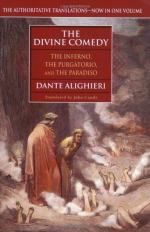|
|
The Inferno Topic Tracking: Politics
Canto I
Politics 1: Dante predicts that a Greyhound will rise up in Italy and slay the She-wolf. The wolf represents the corrupt papacy. There are various opinions of who Dante believed this political savior would be.
Canto VI
Politics 2: Ciacco, a former citizen of Florence, tells Dante that the vying parties in Florence, the city of envy, will war and one will conquer the other. He is referring to the Black and White Guelfs. Dante is a White Guelf. Dante asks specifically about the fates of specific former politicians of Florence, and Ciacco also tells him that they and many of their contemporaries are now deep in the lower circles of Hell being punished for various sins.
Canto X
Politics 3: Dante discovers Farinata among the heretics in a flaming tomb. A former Ghibelline party leader, Farinata voraciously discusses Florence’s past, present, and future politics with Dante. He boasts that his party routed the Guelfs several times, but Dante reminds him that at present the Ghibellines had not been in power in Florence for some time. Farinata retorts that Dante’s faction, the White Guelfs, will be exiled in the near future as well.
Canto XVI
Politics 4: In the third round of the seventh circle, Dante meets Guido Guerra, Tegghiaio Aldobrandi, and Jacopo Rusticucci; contemporary patriots of Dante. They ask for reports of Florence, and Dante weeps telling them Florence suffers from pride and excess. They look at each other as if they have heard the truth and commiserate with Dante.
Canto XIX
Politics 5: Dante condemns Pope Nicolas III, who he meets in the third ring of the seventh circle, for making the Catholic Church a whore to the kings, for wedding the Church to politics and money rather than to righteousness. He goes on to bitterly lament Constantine’s choice to give money to the Popes. Virgil approves of Dante’s harsh criticism.
Canto XXIII
Politics 6: Dante finds two Bolognese Friars, Catalano and Loderingo in the sixth chasm of the eighth circle. They belonged to the Guelf and Ghibbelline families respectively and were chosen to take religious positions in Florence with idea that outsiders could soothe political tension in the city. They are punished for hypocrisy in Dante’s hell.
Canto XXIV
Politics 7: Vanni Fucci maliciously reveals to Dante the sad future of his political party, the White Guelfs. He alludes to the minor success of the Whites in Pistoia followed by their complete exile from Florence.
Canto XXVII
Politics 8: Dante defames Count Guido da Montefeltro as being an evil counselor. He advised Pope Boniface VIII to offer an enemy amnesty and then attack them when their guard was down.
Canto XXXII
Politics 9: Dante reviles and is revolted by Bocca, a Ghibelline by blood who when fighting in a key battle for the Guelfs betrayed them. He is frozen neck-deep in the lowest circle of Hell.
Canto XXXIII
Politics 10: Dante condemns Pisa and it’s citizens Count Ugolino and Archbishop Ruggieri. They are frozen in next to each other in the lowest circle of Hell, one gnawing upon the skull of the other. Ugolino betrayed the Guelf party of Pisa by conspiring with Ruggieri, the leader of the Ghibelline party, to get rid of one of his Guelf competitors; however, having thus weakened the Guelf party, Ruggieri imprisoned Ugolino as well as four of his sons and grandsons and let them starve to death.




